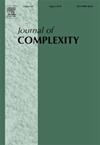随机积分方法的一致性
IF 1.8
2区 数学
Q1 MATHEMATICS
引用次数: 4
摘要
我们证明了一类随机积分方法,包括基于(t,d)序列的平均值,拉丁超立方采样,Frolov点以及Cranley-Patterson旋转,一致地估计了可积函数的期望。这里的一致性指的是对感兴趣的积分的估计量的均值收敛和/或概率收敛。此外,我们提出了中值修正方法,并证明了Lp中具有p>1一致性的被积函数的几乎肯定收敛性。本文章由计算机程序翻译,如有差异,请以英文原文为准。
Consistency of randomized integration methods
We prove that a class of randomized integration methods, including averages based on -sequences, Latin hypercube sampling, Frolov points as well as Cranley-Patterson rotations, consistently estimates expectations of integrable functions. Consistency here refers to convergence in mean and/or convergence in probability of the estimator to the integral of interest. Moreover, we suggest median modified methods and show for integrands in with consistency in terms of almost sure convergence.
求助全文
通过发布文献求助,成功后即可免费获取论文全文。
去求助
来源期刊

Journal of Complexity
工程技术-计算机:理论方法
CiteScore
3.10
自引率
17.60%
发文量
57
审稿时长
>12 weeks
期刊介绍:
The multidisciplinary Journal of Complexity publishes original research papers that contain substantial mathematical results on complexity as broadly conceived. Outstanding review papers will also be published. In the area of computational complexity, the focus is on complexity over the reals, with the emphasis on lower bounds and optimal algorithms. The Journal of Complexity also publishes articles that provide major new algorithms or make important progress on upper bounds. Other models of computation, such as the Turing machine model, are also of interest. Computational complexity results in a wide variety of areas are solicited.
Areas Include:
• Approximation theory
• Biomedical computing
• Compressed computing and sensing
• Computational finance
• Computational number theory
• Computational stochastics
• Control theory
• Cryptography
• Design of experiments
• Differential equations
• Discrete problems
• Distributed and parallel computation
• High and infinite-dimensional problems
• Information-based complexity
• Inverse and ill-posed problems
• Machine learning
• Markov chain Monte Carlo
• Monte Carlo and quasi-Monte Carlo
• Multivariate integration and approximation
• Noisy data
• Nonlinear and algebraic equations
• Numerical analysis
• Operator equations
• Optimization
• Quantum computing
• Scientific computation
• Tractability of multivariate problems
• Vision and image understanding.
 求助内容:
求助内容: 应助结果提醒方式:
应助结果提醒方式:


